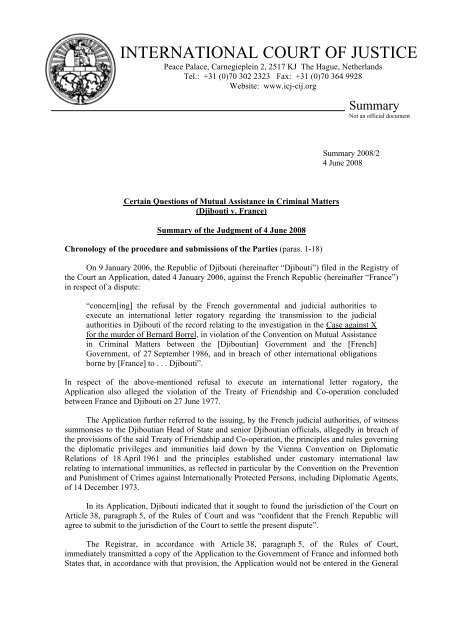The Process Involved in Filing Letters Rogatory: A Step-by-Step Guide
The Process Involved in Filing Letters Rogatory: A Step-by-Step Guide
Blog Article
The Duty of Letters Rogatory in International Law: Key Insights
Letters rogatory offer as a pivotal tool in worldwide regulation, assisting in cross-border legal aid by enabling territories to officially ask for proof and activities from one an additional. What implications might these obstacles have for future legal process?
Definition of Letters Rogatory
In the world of international regulation, letters rogatory serve as official requests provided by a court in one territory to seek aid from a court in one more territory. Letters rogatory. These requests are especially significant in cross-border legal process, where the enforcement of a court's order or the gathering of proof might be hindered as a result of jurisdictional restrictions

The procedure typically requires the asking for court to verbalize the specific information or activity required from the foreign court, sticking to the legal methods and conventions established in between the jurisdictions involved. As soon as issued, the letters rogatory are sent with diplomatic networks, which may consist of consular offices or consulates, to make certain that the request is identified and acted upon by the international court. Generally, letters rogatory exemplify the participating structure necessary for effective global legal procedures.
Historical Context
Although the method of letters rogatory has ancient roots, its formalization within the structure of worldwide regulation emerged dramatically in the 20th century. Historically, such requests for judicial help were utilized in different lawful customs, consisting of Roman law, where they assisted in cross-border cooperation in legal issues. The concept got restored attention with the surge of globalization and the enhancing intricacy of global legal interactions.
The mid-20th century saw the facility of treaties and conventions that looked for to standardize the process of letters rogatory. Significantly, the 1970 Hague Convention on the Taking of Proof Abroad in Industrial or civil Issues gave a structured method, boosting the efficiency of these requests - Letters rogatory. This period marked a change from informal arrangements to an extra organized framework, which dealt with the difficulties postured by varying national legal systems
As states became much more synergistic, the demand for reliable devices to collect proof throughout boundaries became obvious, strengthening the function of letters rogatory in assisting in global participation. Today, they continue to be a critical instrument for obtaining evidence and ensuring that justice transcends nationwide borders, mirroring the advancing nature of global regulation in feedback to international obstacles.
Refine of Issuing Demands
The procedure of providing letters rogatory normally includes a number of important steps created to guarantee that requests for judicial support are clear, particular, and compliant with both global and domestic legal standards. Originally, an event seeking support should prepare an official demand that outlines the important truths of the case, the alleviation looked for, and the certain evidence or testament called for. This paper should be crafted with accuracy to satisfy the legal needs of the jurisdiction in which it will certainly be submitted.
Following the prep work of the request, it is sent to the suitable authority, usually a court or an assigned governmental agency. This authority assesses the request to guarantee it abides by lawful standards and step-by-step norms. When approved, the request is sent to the foreign territory through polite networks.
Upon receipt, the international court assesses the demand's conformity with its regional regulations and redirected here practices (Letters rogatory). If approved, it continues to perform the demand, which may include the issuance of subpoenas or the collection of proof. Throughout this process, preserving clear interaction in between the requesting and getting territories is important to guarantee effective cooperation and the satisfaction of the demand
Challenges and Limitations
Difficulties and constraints often emerge in the process of performing letters rogatory, commonly coming from varying lawful systems and procedures in between jurisdictions. One considerable challenge is the differing criteria of admissibility for proof, which can lead to problems in the acceptance of paperwork asked for via letters rogatory. In addition, the absence of uniformity in legal terminology and definitions can create misunderstandings, complicating communication between courts in different countries.
Furthermore, delays are typical because of governmental procedures, as the demand might require to go through several layers of lawful authorities before it is satisfied. In some instances, the requested jurisdiction may do not have the necessary sources or readiness to coordinate, better preventing the procedure. Language obstacles likewise contribute to challenges, as accurate translation of lawful documents is crucial for ensuring that the intended message is shared without distortion.
Last but not least, sovereignty worries might occur, as some states are reluctant to adhere to demands that they regard as infringing upon their legal autonomy. These challenges highlight the intricacies intrinsic in using letters rogatory, necessitating better harmonization and participation amongst international lawful systems to improve their efficiency.

Effect On International Cooperation
Acknowledging the relevance of letters rogatory in cultivating international cooperation is important, as these demands promote cross-border lawful assistance and promote collaborative efforts in civil and criminal issues. By allowing one territory to officially request assistance from another, letters rogatory create a structured legal framework that enhances the efficiency of international communication between judicial authorities.
Using letters rogatory helps to establish mutual trust and respect amongst countries, which is essential in an increasingly interconnected globe. They work as a device not just for collecting evidence however likewise for guaranteeing that legal processes are promoted throughout boundaries. This is especially essential in combating multinational crime, where the hop over to these guys inability to secure participation can weaken justice.
In addition, the dependence on letters rogatory can enhance complicated legal process, lowering hold-ups and uncertainties in international examinations. The procedural safeguards fundamental in this procedure add to the security of individual civil liberties while assisting in collaboration among states. Inevitably, the effect of letters rogatory on international participation highlights their role as essential tools in the promotion of justice, promoting a collaborative spirit that goes beyond national borders and legal systems.
Verdict
To conclude, letters rogatory offer as a crucial tool in worldwide law, assisting in cross-border legal help and cooperation. Regardless of fundamental obstacles such as differing lawful standards and administrative hold-ups, their standard procedures advertise trust among nations. The continued development of these devices is essential for improving the performance of worldwide lawful procedures, ultimately promoting more powerful cooperation her explanation in both civil and criminal matters across territories. The importance of clear communication in this context can not be overemphasized.
Letters rogatory offer as a crucial tool in global law, facilitating cross-border legal assistance by allowing jurisdictions to formally request evidence and actions from one another.The procedure generally requires the asking for court to express the specific details or activity required from the international court, sticking to the legal procedures and conventions established between the jurisdictions entailed. Historically, such demands for judicial aid were made use of in numerous lawful customs, including Roman law, where they facilitated cross-border cooperation in lawful issues.The process of issuing letters rogatory generally involves numerous essential actions developed to guarantee that requests for judicial aid are clear, certain, and compliant with both domestic and global legal criteria.Additionally, delays are usual due to governmental processes, as the request might need to pass via several layers of lawful authorities prior to it is fulfilled.
Report this page